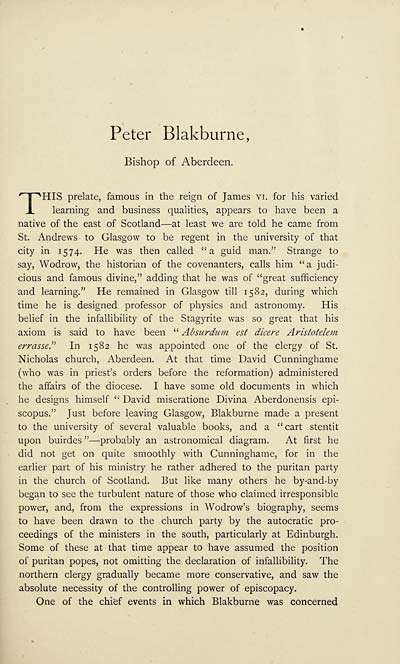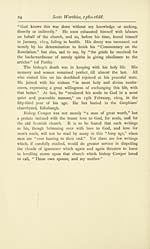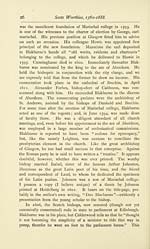Scots worthies, 1560-1688
(45) Page 25 - Peter Blakburne, Bishop of Aberdeen
Download files
Complete book:
Individual page:
Thumbnail gallery: Grid view | List view

Peter Blakburne,
Bishop of Aberdeen.
THIS prelate, famous in the reign of James vi. for his varied
learning and business qualities, appears to have been a
native of the east of Scotland — at least we are told he came from
St. Andrews to Glasgow to be regent in the university of that
city in 1574. He was then called "a guid man." Strange to
say, Wodrow, the historian of the covenanters, calls him "a judi-
cious and famous divine," adding that he was of "great sufficiency
and learning." He remained in Glasgow till 1582, during which
time he is designed professor of physics and astronomy. His
belief in the infallibility of the Stagyrite was so great that his
axiom is said to have been " Absurdum est dicere Aristotelem
errasse." In 1582 he was appointed one of the clergy of St.
Nicholas church, Aberdeen. At that time David Cunninghame
(who was in priest's orders before the reformation) administered
the affairs of the diocese. I have some old documents in which
he designs himself " David miseratione Divina Aberdonensis epi-
scopus." Just before leaving Glasgow, Blakburne made a present
to the university of several valuable books, and a "cart stentit
upon buirdes " — probably an astronomical diagram. At first he
did not get on quite smoothly with Cunninghame, for in the
earlier part of his ministry he rather adhered to the puritan party
in the church of Scotland. But like many others he by-and-by
began to see the turbulent nature of those who claimed irresponsible
power, and, from the expressions in Wodrow's biography, seems
to have been drawn to the church party by the autocratic pro-
ceedings of the ministers in the south, particularly at Edinburgh.
Some of these at that time appear to have assumed the position
of puritan popes, not omitting the declaration of infallibility. The
northern clergy gradually became more conservative, and saw the
absolute necessity of the controlling power of episcopacy.
One of the chief events in which Blakburne was concerned
Bishop of Aberdeen.
THIS prelate, famous in the reign of James vi. for his varied
learning and business qualities, appears to have been a
native of the east of Scotland — at least we are told he came from
St. Andrews to Glasgow to be regent in the university of that
city in 1574. He was then called "a guid man." Strange to
say, Wodrow, the historian of the covenanters, calls him "a judi-
cious and famous divine," adding that he was of "great sufficiency
and learning." He remained in Glasgow till 1582, during which
time he is designed professor of physics and astronomy. His
belief in the infallibility of the Stagyrite was so great that his
axiom is said to have been " Absurdum est dicere Aristotelem
errasse." In 1582 he was appointed one of the clergy of St.
Nicholas church, Aberdeen. At that time David Cunninghame
(who was in priest's orders before the reformation) administered
the affairs of the diocese. I have some old documents in which
he designs himself " David miseratione Divina Aberdonensis epi-
scopus." Just before leaving Glasgow, Blakburne made a present
to the university of several valuable books, and a "cart stentit
upon buirdes " — probably an astronomical diagram. At first he
did not get on quite smoothly with Cunninghame, for in the
earlier part of his ministry he rather adhered to the puritan party
in the church of Scotland. But like many others he by-and-by
began to see the turbulent nature of those who claimed irresponsible
power, and, from the expressions in Wodrow's biography, seems
to have been drawn to the church party by the autocratic pro-
ceedings of the ministers in the south, particularly at Edinburgh.
Some of these at that time appear to have assumed the position
of puritan popes, not omitting the declaration of infallibility. The
northern clergy gradually became more conservative, and saw the
absolute necessity of the controlling power of episcopacy.
One of the chief events in which Blakburne was concerned
Set display mode to:
![]() Universal Viewer |
Universal Viewer | ![]() Mirador |
Large image | Transcription
Mirador |
Large image | Transcription
Images and transcriptions on this page, including medium image downloads, may be used under the Creative Commons Attribution 4.0 International Licence unless otherwise stated. ![]()
| Histories of Scottish families > Scots worthies, 1560-1688 > (45) Page 25 - Peter Blakburne, Bishop of Aberdeen |
|---|
| Permanent URL | https://digital.nls.uk/95151566 |
|---|---|
| Description | A selection of almost 400 printed items relating to the history of Scottish families, mostly dating from the 19th and early 20th centuries. Includes memoirs, genealogies and clan histories, with a few produced by emigrant families. The earliest family history goes back to AD 916. |
|---|

